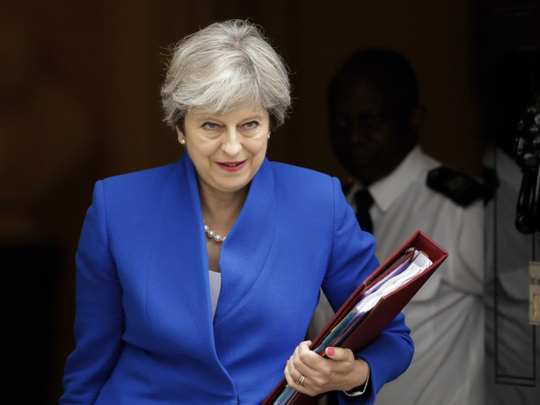
When will the British government realise that exiting the European Union is an own goal? All the signs indicate there is little benefit to be had by this bitter divorce and some former committed Brexiteers have got the message.
Calls for a second referendum made by the UK’s former Deputy Prime Minister Nick Clegg, leader of the Liberal Democrats Tim Farron and the admittedly unpopular Tony Blair have gone unheeded. The fact is that according to a survey conducted by the market research agency Survation 54 per cent of Britons would now vote to remain.
A senior official from Germany’s Social Democrat party Katarina Barley advocates a second referendum on the basis that “when the referendum was held nobody really knew what it would be about, not the British people, not even the political class.” She has a point.
Countries are not queuing up waiting to cement trade deals with Downing Street; most are tied up within mega trading blocs. The deal promised by President Donald Trump is unlikely to manifest now that the US-UK relationship has cooled causing the cancellation of his state visit to London. Instead, he was royally feted by Poland and France. In any event, under EU rules, negotiations cannot begin until the UK is officially out.
Predictions that the EU was heading for collapse due to rising nationalist sentiments have not panned out. If anything, member states are rallying behind the German Chancellor Angela Merkel and the savvy young French President Emmanuel Macron, both committed to a stronger, more unified European club, in which renegade Britain has few cheer leaders.
The Decree Absolute is scheduled to be finalised on Friday, March 29. However, Brussels holds most of the cards and is wielding them fiercely. With a mere 20 months left, negotiations have stalled amid a hostile atmosphere and the unpreparedness of the UK’s negotiators.
Earlier this month, the EU’s head negotiator Michael Barnier warned there would be no progress until Britain accepts to pay the divorce bill of over €100 billion (Dh477.2 billion), which can hardly be considered loose change.
Britain’s Foreign Secretary Boris Johnson complained that the sums are “extortionate” adding, that “go whistle is an entirely appropriate expression.” It appears he is whistling to the wind. “I am not hearing any whistling, just the clock ticking,” Barnier retorted.
In January, the British Prime Minister Theresa May said ‘No deal for Britain is better than a bad deal for Britain”. Experts disagree.
“Leaving the EU with no deal would mean tariffs on trade and legal chaos with every British company selling to the EU unsure if they are doing so legally; and Britain’s alliances with other European countries in ruins,” said the Director of Research at the Centre for European Reform John Springford.
Supporting Springford’s predictions is a recently published report, by The UK in a Changing Europe, that warns of dire consequences for Britain — “a political mess, a legal morass and an economic disaster” — in the event the UK heads into the sunset.
Whatever the end game, the UK is set to bleed jobs. Jittery banks and financial services companies are planning to move jobs to the European mainland or expand their European operations.
Barclays Bank is eyeing the Irish capital Dublin as its new HQ. Deutsche Bank is mulling moving 4,000 jobs to Germany. Goldman Sachs is shutting down some of its hedge fund activities in London; its chief executive warned that the capital’s financial centre could “stall”. Some 40 per cent of games companies are weighing their options. Credit Suisse portends a one in three chance that Britain could end up in recession at the end of this year.
The sterling pound has already shuddered against the dollar pushing up inflation and the UK is facing a budget deficit due to higher interest on its borrowings. So far the stock market has held up but the markets hate uncertainty and unless there is clarity from the government on the way negotiations are going — or not going — expect investor nervousness.
In my own view pursuing exit from the EU is a fool’s errand; the negatives vastly outweigh the positives. “As long as the government stays in denial about Brexit’s drawbacks, the country is on course for disaster,” warns The Economist. Moreover, Theresa May’s own position within her party is on thin ice since she initiated a general election aimed at consolidating her power, which went terribly wrong. She squandered a healthy Conservative majority and cannot get her party’s agendas through Parliament without cooperation from the Northern Irish DUP Party. The Tories are split. May was forced to rap cabinet colleagues on the knuckles last week in an effort to maintain unity.
The sad irony is this. Although the prime beef of those who voted out was the influx of Europeans into their country, Britain’s Secretary of State for the Environment Michael Gove has conceded that Europeans’ free movement between the mainland and the UK can continue for a transitional period of up to three years, which may signify a slippery slope. With the EU firmly in the driving seat, there will be many more concessions to come.
Britain urgently needs a rethink. David Cameron’s referendum was a blunder. A second could be the country’s saving grace.
Linda S. Heard is an award-winning British political columnist and guest television commentator with a focus on the Middle East.








